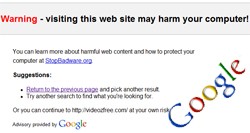Google Expands Efforts To Prevent Search Engine Users from Visiting Malicious Sites
 Google has recently made some extra steps in expanding a program that will prevent search engine users from visiting sites that are designed to scam people out of their money and personal information or install malware.
Google has recently made some extra steps in expanding a program that will prevent search engine users from visiting sites that are designed to scam people out of their money and personal information or install malware.
In the past, we have reported instances where Google search results were poisoned with links to malicious websites. One recent scam was when hackers were found to poison the search results for "Harry Potter and the Deathly Hallows". To crack down on these malicious links populating search results, Google beefed up their ability to warn computer users of compromised sites or those who have malicious content.
A 'poisoned search result' is a generic term used to describe search results on a search engine that contains malicious links to scam websites. Hackers or rogue creators are able to "game" search engines by using "blackhat SEO (Search Engine Optimization)" techniques so their malicious sites appear on the first page of certain search keywords. Usually the scam website users are sent to, when clicking on a malicious link from a poisoned search result, is either a legitimate site that was compromised by hackers or one the hacker has created to either promote a scam or spread malware.
The feature that Google is expanding to prevent users from visiting malicious sites includes the words "This site may be compromised" tagged to search results that Google's automated tools has already indicated as a site that may be affected by scammers, phishers, spammers or other types of hackers. Beefing up these efforts would basically label a large number of compromised sites as malicious. It also would be a big step in the right direction to cleaning up the Internet and limiting the amount of malware and scams circulating the Web.
Google's search engine already displayed the words "This site may harm your computer" when a search query would return sites detected as being malicious, but in this case, computer users, who wanted to visit a site tagged as malicious, would have to manually copy the URL of the malicious site in the query and paste it in a web browser to be able to visit the malicious site. Now, with Google's changes to the "This site may harm your computer" warning feature, computer users who don't want to adhere to Google's warning and wish to visit the malicious site may conveniently click on the malicious link provided in the results page.
This expansion to the "This site may harm your computer" warning feature creates a situation where Google is able to label a much larger amount of sites as malicious or scam pages. Even though users will be able to click the search query of a site found to be either compromised or have malicious content, each search engine user would have been warned through the "This site may be compromised" notification.
Also, included in this new upgrade, Google has attempted to resolve an issue among webmasters who complained that it took too long to remove the "This site may be compromised" tag once their sites were no longer compromised. Webmasters can now contact Google and request expedited reviews for a site that has been "fixed" or disinfected. This would greatly improve the accuracy and turn-around time for when Google labels certain sites as being "clean" or "malicious".
Do you think this new feature would greatly reduce the spread of malware and scams through sites that Google has identified as being compromised or ones that spread malware?